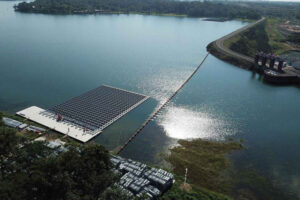
Thailand’s Clean energy plan to generate 2.9 trillion baht
Solar key to carbon dioxide reduction
A floating solar farm operated by Egat at the Sirindhorn Dam in the northeastern province of Ubon Ratchathani.
The new National Energy Plan (NEP), Thailand’s first serious guideline to promote clean energy, is expected to generate 2.9 trillion baht in capital spending over the next 13 years, with solar energy a key factor to cut carbon dioxide.
The 2024 NEP, set to be enforced from this year to 2037, comprises a power development plan, an oil plan, a gas plan, an alternative energy plan and an energy efficiency plan.
Most of the money, accounting for 1.52 trillion baht, comes from renewable energy development and some investment in fossil-fuel power plants, said an official at the Energy Ministry who requested anonymity.
Fossil fuels are still needed for power generation, but their usage will be on a decline.
Under the power development plan, the proportion of coal and gas is set to decrease to 48% of total fuel use by 2037, down from nearly 80% early this year, while renewable energy should comprise 51%, up from 20% at the end of last year.
The 20% share includes hydropower imported from Laos.
The other 1% comes from nuclear energy and new energy solutions aimed at reducing fossil fuel usage and saving electricity.
In the renewable energy segment, solar energy development is expected to accelerate, with power generation capacity estimated to reach at least 1,000 megawatts, said the official.
The additional capacity is based on the availability of the country’s transmission systems, he said.
These projects do not include floating solar panels which will be separately developed by the Electricity Generating Authority of Thailand (Egat).
Egat plans to install floating solar farms, with 2,700MW in capacity, at its reservoirs nationwide between 2025 and 2029.
Of the 2.9 trillion baht, 425 billion baht comes from new energy businesses, including carbon capture storage, energy storage systems and small modular reactor (SMR) development, the official said.
An SMR is a type of nuclear power technology with a capacity of up to 300MW per unit, about one-third of the generating capacity of larger, traditional nuclear power reactors, according to the International Atomic Energy Agency.
According to the official, 415 billion baht comes from smart grid development, 310 billion from oil and gas-related projects, including their exploration and production, 115 billion from electric vehicles and oil transport through pipelines, and 114 billion from bio-based fuels, including sustainable aviation fuel.
Source: https://www.bangkokpost.com/business/general/2885062/clean-energy-plan-to-generate-b2-9tn


